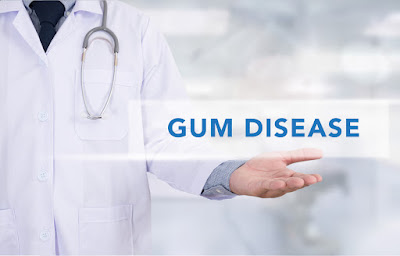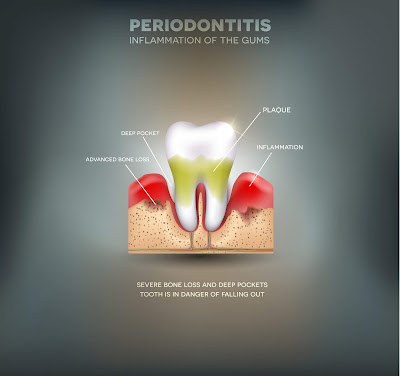What Is Periodontal Or Gum Disease?
When in school we are taught to brush two times a day regularly, we take it very lightly. However, one experiences the after-effects in the future as time passes. Oral disease may seem to be small, but they require a right amount of treatment and care as well. Thus, one should stop taking their dental emergencies lightly.
Periodontal also known as the gum diseases refers to an infection or swelling of the tissues that support or hold the teeth. It is said to be one of the primary reasons for tooth loss. A plaque is developed that is the home of sticky film of bacteria. They build upon the tissues of the teeth and harden it.
 |
| Periodontal Or Gum Disease |
Also, dentists such as Dr. Roman Fedorciw, a Rocky Hill Dentist, and other trusted dentists and their excellent team of doctors successfully treat periodontal diseases and many other oral diseases and issues. There are many clinics where there is nothing more important than a satisfied patient. Proper dental care experts put their heart and soul into their work and provide the best quality personalized treatment at the best possible prices.
Visit any trusted dental clinic anywhere, and all their talented, skilled, trained and highly experienced doctors are always there to help.
Clinics such as Rocky Hill Dentist and many others provide necessary high-quality services using the best and modern technology whenever the patients demand. The patients are treated like family, and they maintain 100% work transparency, which sets them apart from others. Let us guide you more about the gum diseases.
What Are The Causes Of Gum Diseases?
It has been observed that formation of plaque is the primary reason for periodontal or gum disease. However, other factors contribute to gum disease, which is as follows:
- Another Disease
Other illness or disease may also cause infection in the gums. The types of diseases that cause such condition of the gums are HIV, cancer or diabetes.
- Medicines Used
Besides, the type of drugs used for the treatment of various diseases or illness also has side effects as it causes abnormal growth of gum tissues. Some medications are Dilantin, Adalat, etc.
- Smoking
Smoking also affects the growth of tissues as it causes the formation of bacteria inside the mouth; this hardens the gum tissues.
- Vitamin C Deficiency
It is necessary that your diet contains food items that provide vitamin C. As a diet rich in sugar and carbohydrates but low in vitamin C and water causes gum problems.
- Unhygienic
Not brushing regularly or not brushing two times a day or not flossing on a daily basis quickly gives birth to bacteria.
- Hormonal Shift
During pregnancy, menstruation, menopause, extra puberty care of teeth are required as during such period the teeth become sensitive and thus it becomes easy to contract a gum problem.
- Family History
If it has been your family history of gum problem, then you must mention it to the dentist before the treatment.
What Are The Symptoms Of Gum Disease?
The typical symptoms of gum disease are:
- Loose or shifting teeth
- Sensitive teeth
- Swollen gums
- Bad breath
- Bleeding gums
- Pain while chewing
- Longer appearing teeth
- Formation of gaps between teeth and gums
- Tender Gums
The various treatments available for gum diseases are as follows:
- Root planing or curettage
- Flap surgery
- Periodontal plastic surgery
- Bone Grafts
- Scaling
- Polishing
- Gingivectomy surgery
- Removal of unhealthy tissues
- Medications such as- antibiotics, a penicillin antibiotic, topical antiseptic
Before the gum disease becomes a severe issue, one can also prevent gum diseases by undertaking the following steps:
- Quit smoking
- Visit the dentist regularly
- Include food items in the diet which contain vitamin C
- Brush two times a day
- Do flossing regularly
- Use fluoride toothpaste
- Use mouthwash, which helps to, removes remaining food particles that brushing and flossing missed.
Therefore, be it a small dental emergency or a major dental emergency visiting the dentist at the earliest stage is a vital necessity. So never, take your dental problems or crisis lightly as oral health is equally important and therefore one must not ignore it. Also immediately, develop oral hygiene habits not only in yourself but also in your other family members. Learn to take care of your teeth.





No comments:
Post a Comment